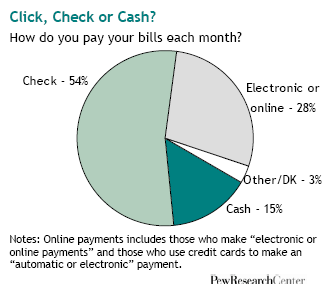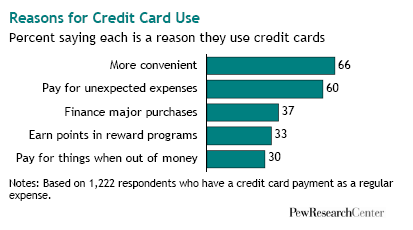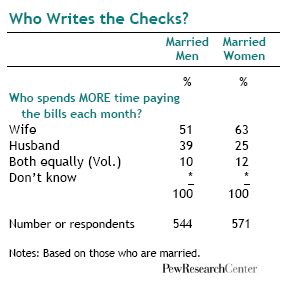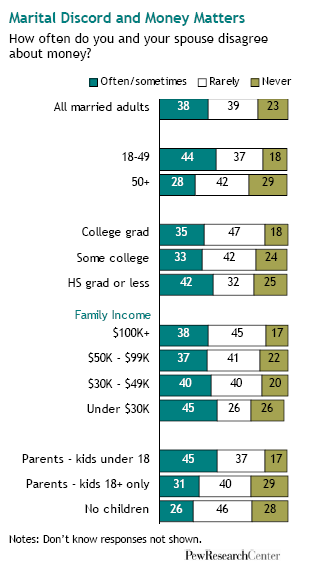I. Overview
 Paying the monthly bills is a different experience for Americans now than it was a generation ago, a new Pew Research Center survey has found. A sizable minority of adults do most of their transactions online. A sizable majority pays for one or more of the “big three” information age consumer staples each month — internet connection, cell phone service and cable or satellite television service. And at the same time that they are carrying the cost of these new technologies, Americans are also paying off record levels of credit card debt each month.
Paying the monthly bills is a different experience for Americans now than it was a generation ago, a new Pew Research Center survey has found. A sizable minority of adults do most of their transactions online. A sizable majority pays for one or more of the “big three” information age consumer staples each month — internet connection, cell phone service and cable or satellite television service. And at the same time that they are carrying the cost of these new technologies, Americans are also paying off record levels of credit card debt each month.
The Pew survey finds that nearly three-in-ten adults (28%) say the most common way they take care of their regular monthly bills is by an online or electronic payment. A bare majority (54%) mostly uses checks, and a small minority (15%) mostly uses cash.
 The survey also finds that at or near the top of the public’s list of regular expenses are cable or satellite television service (78% of adults say they pay such bills every month); cell phone service (74%) and internet connections (65%). These information age staples either didn’t exist or were in their infancy a generation ago. When survey respondents were given a list of common household expenses, the only one they cited as often as these three was housing (76%).
The survey also finds that at or near the top of the public’s list of regular expenses are cable or satellite television service (78% of adults say they pay such bills every month); cell phone service (74%) and internet connections (65%). These information age staples either didn’t exist or were in their infancy a generation ago. When survey respondents were given a list of common household expenses, the only one they cited as often as these three was housing (76%).
 Another regular expense for most Americans is credit card bills. Among the 58% of adults who say they have a credit card as a regular household expense, about four-in-ten (41%) report that they generally pay their credit card bills in full each month while a 53% majority says that they usually make a payment. Credit card usage and debt have grown dramatically over the past generation, according to government and industry reports.1
Another regular expense for most Americans is credit card bills. Among the 58% of adults who say they have a credit card as a regular household expense, about four-in-ten (41%) report that they generally pay their credit card bills in full each month while a 53% majority says that they usually make a payment. Credit card usage and debt have grown dramatically over the past generation, according to government and industry reports.1
The Pew survey finds that convenience and short-term financing are at the top of the list of reasons people give for using credit cards. But the reasons vary by income levels. People with high incomes are more likely to cite convenience and rewards programs; people with lower incomes are more likely to cite unexpected expenses or the need to pay for things when they run out of money.
This telephone survey of America’s bill-paying, budgeting and credit card practices was conducted from October 18 through November 9, 2006 among a nationally representative sample of 2,000 adults; it has a margin of sampling error of plus or minus 2.5 percentage points.
 Among the survey’s other key findings:
Among the survey’s other key findings:
To Budget or Not to Budget? Americans are evenly divided about having some sort of formal budget to help them manage their household expenses – 48% say they use one, 51% say they don’t. There is virtually no difference on this question by gender, by income level or by race. People who are paying off a lot of loans are more prone to use a budget, as are people who at some point in their lives have had a problem with debt.
“Major Expenses” Vary by Income level. People with high incomes are more than twice as likely as those with low incomes to describe dining out and vacation travel as “major expenses” in their lives. Conversely, those with low incomes are much more likely to describe medical or dental bills as a major expense.
Cash Is a Lesser King: When it comes to paying for everyday expenses (as opposed to monthly bills), cash is no longer king – or at least not a fully sovereign king. Just 37% of Americans say they mainly use cash for their everyday purchases, while 31% say they use debit cards, 16% say they use credit cards and 15% say they use checks.
 Money and Marriage: In the annals of human history, money has been known to cause a marital spat or two. The Pew survey finds that spousal disagreements about money extend even to the seemingly straightforward question of which partner spends more time each month paying the bills.
Money and Marriage: In the annals of human history, money has been known to cause a marital spat or two. The Pew survey finds that spousal disagreements about money extend even to the seemingly straightforward question of which partner spends more time each month paying the bills.
Most wives say they do. Most husbands agree that their wives do. So far, so good. But upon further inspection, a spousal gap emerges. Fully 63% of all wives say they pay the bills, while just 51% of all husbands say their wives pay the bills. People, can we talk?
Meantime, spouses also have what are presumably more substantive disagreements about financial matters. Nearly four-in-ten married adults say they and their spouse often (13%) or sometimes (25%) disagree about money. Another 39% say they rarely disagree with their spouse over money, and 23% say they never disagree.
Couples more likely to have disagreements about money include those with lower incomes; those with children under age 18; those who are younger; and those who have less education.


